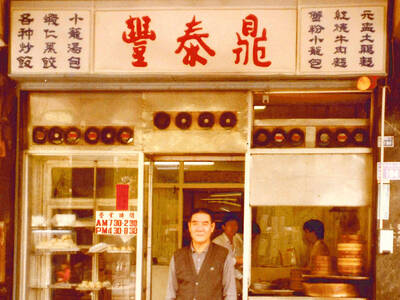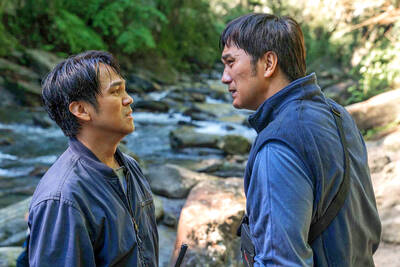Haleakala is named after a volcano on the island of Maui, but if you go there expecting succulent roast pig, bowls of poi or spam musubi, then you’ll be disappointed. If all you want are fruity cocktails in a modernized tiki bar, however, then the restaurant in Xinyi District’s newly opened Bellavita shopping center just might hit the spot.
Sleek white lamps topped with giant mounds of fake fruit — mangos, bananas, apples, oranges — greet visitors as soon as they ride up the escalator. Haleakala takes up much of the fourth floor, with sofas, low tables and a bar on the landing. A dimly lit interior section has banquette seating and yet another bar. Spacious patios with outdoor seating look like they will be pleasant places to hold a party when the weather gets warmer. Aside from the fruit towers, Haleakala’s decor also includes huge fiberglass hibiscus blossoms and a straw roof above each bar. Tiki god masks, torches and nets with little plastic fish trapped in them are mercifully — or tragically — absent, depending on your tolerance for kitsch.
Haleakala’s menu consists mainly of tapas that are plated for easy sharing, including mini-burgers (vegetarian patties are available), quesadillas and rice wraps with dipping sauce. On our first visit, my companion and I split the Maryland crab cake appetizer with wasabi mayonnaise (NT$280). We were surprised to get bite-sized lumps of breaded and fried crabmeat delicately arranged on a rectangular white platter next to little dollops of sauce. Fortunately, the crispy breading did not distract too much from the fresh crabmeat and the wasabi mayonnaise packed just enough punch (though it could have been spicier). I ordered the avocado and tuna tartar lettuce wrap (NT$240) as my entree, but portions were small and the dish would have worked better as another appetizer. The lightly chopped tuna was mixed with guacamole, red onions and topped with toasted almond slivers and slices of taro root crisps. The red onions were distracting, but the almonds and taro added an unexpected and pleasurable bit of crunch and flavor. My companion ordered the smoked chicken quesadilla with sauteed bell pepper, onion, kidney beans and cheese (NT$220). It came with miniscule dollops of salsa, sour cream and guacamole; overall, the flavor was unmemorable.
Heartier items on the menu include the mini burgers, which are stuffed with fat and tasty beef patties cooked medium rare. The Maui mini-burgers are topped with guacamole, lettuce, tomato, pickle and sauteed onions (NT$240). The onions should have been listed first, however, because of the sizeable portion. Long strands were wrapped in a nest around the guacamole. The onions were sweet and I didn’t mind them on their own, but they obscured the flavor of the avocado (and had a tendency to slip out of the burger every time I took a bite). Diners who like their burgers relatively unencumbered might want to try the Malibu (NT$240), topped with lettuce, tomato, bacon and cheese.
Like any good tiki bar, Haleakala has an extensive menu of fruity cocktails. Our friendly waiter suggested the Hawaiian Cosmopolitan (NT$220), a scoop of mango sorbet in Citroen vodka with apple and lime juice. A few non-alcoholic cocktails are available, including the very sweet Summer Sounds (NT$200), made with passion fruit, orange and lemon juice, honey and yogurt.

March 24 to March 30 When Yang Bing-yi (楊秉彝) needed a name for his new cooking oil shop in 1958, he first thought of honoring his previous employer, Heng Tai Fung (恆泰豐). The owner, Wang Yi-fu (王伊夫), had taken care of him over the previous 10 years, shortly after the native of Shanxi Province arrived in Taiwan in 1948 as a penniless 21 year old. His oil supplier was called Din Mei (鼎美), so he simply combined the names. Over the next decade, Yang and his wife Lai Pen-mei (賴盆妹) built up a booming business delivering oil to shops and

Indigenous Truku doctor Yuci (Bokeh Kosang), who resents his father for forcing him to learn their traditional way of life, clashes head to head in this film with his younger brother Siring (Umin Boya), who just wants to live off the land like his ancestors did. Hunter Brothers (獵人兄弟) opens with Yuci as the man of the hour as the village celebrates him getting into medical school, but then his father (Nolay Piho) wakes the brothers up in the middle of the night to go hunting. Siring is eager, but Yuci isn’t. Their mother (Ibix Buyang) begs her husband to let

The Taipei Times last week reported that the Control Yuan said it had been “left with no choice” but to ask the Constitutional Court to rule on the constitutionality of the central government budget, which left it without a budget. Lost in the outrage over the cuts to defense and to the Constitutional Court were the cuts to the Control Yuan, whose operating budget was slashed by 96 percent. It is unable even to pay its utility bills, and in the press conference it convened on the issue, said that its department directors were paying out of pocket for gasoline

On March 13 President William Lai (賴清德) gave a national security speech noting the 20th year since the passing of China’s Anti-Secession Law (反分裂國家法) in March 2005 that laid the legal groundwork for an invasion of Taiwan. That law, and other subsequent ones, are merely political theater created by the Chinese Communist Party (CCP) to have something to point to so they can claim “we have to do it, it is the law.” The president’s speech was somber and said: “By its actions, China already satisfies the definition of a ‘foreign hostile force’ as provided in the Anti-Infiltration Act, which unlike